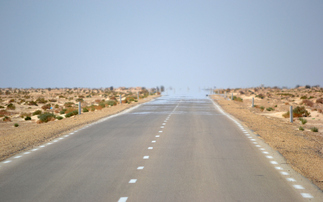The climate outlook may be bleak, but there are stories that suggest the global response is starting to scale up
It somehow managed to be even bleaker than expected, right?
The IPCC's report on 1.5C of warming was commissioned as an exercise in optimism, framing our response to climate change as a choice between 1.5C and 2C when we are currently on track for 3C or more. And yet it still managed to hammer home both the existential nature of the risks and the daunting reality of the decarbonisation challenge. How do you process that the last coral could very easily disappear within your lifetime? How do you envisage a net zero emission global economy before you retire?
You can't, of course, not really. And as such the next job is to cast around for sources of optimism. Thankfully, they do exist. As the IPCC noted, clean tech costs are plummeting. And when set in the context of global capital flows, the scale of required low carbon infrastructure investments are not as mind-blowing as the raw numbers appear. Rapid industrial technology transitions have happened in the past, so it could happen yet.
Moreover, there are thousands of positive developments each and every week that demonstrate how deep decarbonisation is both possible and desirable. What follows is an exercise in catharsis rather than a detailed analysis of the prospects of moving onto a 1.5C trajectory, but each of the 10 stories below are from the last week alone:
1. We are in the midst of a development revolution
As our new SDG Hub makes clear, the world faces immense challenges moving onto a sustainable development path, but the past 18 years have seen an under-reported transformation in the prospects of millions of the world's poorest people. The proportion of people living in extreme poverty halved between 1990 and 2015, maternal and infant mortality rates globally have plummeted, and clean energy is one of the world's fastest expanding industries.
2. Green aviation fuel takes flight
Aviation remains one of the biggest decarbonisation challenges going, but earlier this month Virgin Atlantic completed a flight using fuel from biofuel specialist Lanzatech made from waste industrial gases. The company reckons the technology is scalable and could cut emissions from the aviation sector by 70 per cent.
3. And Norway clears it for take-off
Just days after the Virgin Atlantic plane touched down at Heathrow the Norwegian government announced it is to introduce a green biofuel requirement for airlines from 2020, creating a ready-made market for the nascent green jet fuel sector.
4. Neoen plots €640m mega IPO
One of this year's largest European IPOs is set to be a French renewables developer with global ambitions that only launched a decade ago.
5. UK fires up battery capacity
The sizeable pipeline of UK grid-scale energy storage projects is fats turning into reality, with UK Power Reserve and Fluence confirming a deal is in place to build 120MW of new capacity.
6. The European Parliament has just voted to strengthen vehicle emissions standards and electric vehicle goals
The stage is now set for a showdown with the European Council as MEPs call for EU fleet wide emissions to be cut 40 per cent by 2030.
7. Britvic switches to 100 per cent renewables
The drinks brand has become the latest high profile firm to source 100 per cent renewable power supplies, forming part of a trend that continues to accelerate as clean power costs fall.
8. Maritime CEOs demand bolder climate action
The shipping industry may be guilty of a general go slow on decarbonisation, but CEOs at some of the world's largest shipping companies are trying to change course with a fresh call for the sector to prioritise emissions reduction measures.
9. Multinationals urge EU to embrace net zero climate targets
Over 20 CEOs and civil society leaders last week wrote to the EU pre-empting the IPCC report and urging them to change EU emissions goals to set net zero targets as soon as possible.
10. Project Bo comes online
Last year New Energy Finance founder Michael Liebreich saw a heart-breaking tweet from a doctor at Bo Hospital in Sierra Leone explaining how three babies had died in the neo-natal unit that night because a power cut had stopped the breathing machines working. One year and a £100,000 fund-raising campaign later and Project Bo announced this weekend that a solar array, batteries and running water have been installed, providing the site with reliable clean power. For the first time the babies in the unit - 70 of them per month, many utterly dependent on electrical power for heat and oxygen - are no longer vulnerable to frequent grid power cuts.
This article first appeared as part of BusinessGreen's Overnight Briefing, which is available to subscribers









